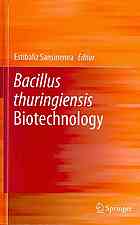

Most ebook files are in PDF format, so you can easily read them using various software such as Foxit Reader or directly on the Google Chrome browser.
Some ebook files are released by publishers in other formats such as .awz, .mobi, .epub, .fb2, etc. You may need to install specific software to read these formats on mobile/PC, such as Calibre.
Please read the tutorial at this link: https://ebookbell.com/faq
We offer FREE conversion to the popular formats you request; however, this may take some time. Therefore, right after payment, please email us, and we will try to provide the service as quickly as possible.
For some exceptional file formats or broken links (if any), please refrain from opening any disputes. Instead, email us first, and we will try to assist within a maximum of 6 hours.
EbookBell Team

0.0
0 reviewsBacillus thuringiensis (Bt) has been used as a biopesticide in agriculture, forestry and mosquito control because of its advantages of specific toxicity against target insects, lack of polluting residues and safety to non-target organisms. The insecticidal properties of this bacterium are due to insecticidal proteins produced during sporulation. Despite these ecological benefits, the use of Bt biopesticides has lagged behind the synthetic chemicals. Genetic improvement of Bt natural strains, in particular Bt recombination, offers a promising means of improving efficacy and cost-effectiveness of Bt-based bioinsecticide products to develop new biotechnological applications. On the other hand, the different Bacillus species have important biotechnological applications; one of them is carried out by producing secondary metabolites, which are the study object of natural product chemistry. The amazing structural variability of these compounds has attracted the curiosity of chemists and the biological activities possessed by natural products have inspired the pharmaceutical industry to search for lead structures in microbial extracts. Screening of microbial extracts reveals the large structural diversity of natural compounds with broad biological activities, such as antimicrobial, antiviral, immunosuppressive, and antitumor activities that enable the bacterium to survive in its natural environment. These findings widen the target range of Bacillus spp., in special B. thuringiensis, besides insecticidal activity and help people to better understand its role in soil ecosystem.